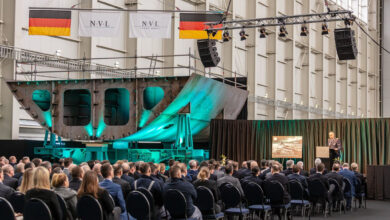German police arrest 6 suspected far-right terrorists planning October 3 assault
Prosecutors say investigations uncovered "tangible indications that the organization pursued terrorist goals"
German police on Monday, October 1 arrested six men on suspicion of belonging to a far-right terrorist group that attacked foreigners in the city of Chemnitz.
The German nationals, aged 20 to 31, were taken into custody for allegedly forming a group called “Revolution Chemnitz” with the aim of subverting the democratic state.
A seventh suspect, believed to be the group’s leader, was detained on September 14.
“Based on the information we have so far, the suspects belong to the hooligan, skinhead and neo-Nazi scene in the area of Chemnitz and considered themselves leading figures in the right-wing extremist scene in Saxony,” prosecutors said, Reuters reported.
“In the course of further investigations we encountered tangible indications that the organization pursued terrorist goals,” prosecutors added.
“They intended to launch violent and armed attacks against foreigners and people who have different political views,” said federal prosecutors in a statement.
Their targets included politicians, civil servants and members of the economic establishment, the prosecutors said.
They added that the group appeared to have been planning an assault on Germany’s Unity Day, which falls on Wednesday.
According to Reuters, prosecutors said the group planned to obtain semi-automatic rifles.
Investigators are still trying to determine if the suspects were involved in the wave of xenophobic marches that swept Chemnitz at the end of August following a fatal stabbing, allegedly by an asylum seeker.
But prosecutors said that five of the suspects “armed with glass bottles, weighted knuckle gloves, and an electroshock appliance, attacked and hurt several foreign residents” on September 14 in Chemnitz.
“Investigations show that the assault was a test-run for an event that one of the accused planned for October 3, 2018,” said prosecutors.
Police are still investigating what exactly was being plotted.
More than 100 police officers were deployed to search apartments and other premises.
“With the arrests and raids, we are sending a clear signal that we are identifying and breaking up such right-wing terrorist structures early,” said Saxony interior minister Roland Woeller.
Germany’s Justice Minister Katarina Barley highlighted the suspects’ links to the football hooligan, skinhead and neo-Nazi scenes and warned that “the network under investigation does not stand in isolation.”
Neo-nazis in Saxony
The arrests once again cast an uncomfortable spotlight on extremism in Saxony state, where Chemnitz is located and which is a stronghold of the far-right AfD party.
A former communist state, Saxony has gained notoriety as the base of several extremist groups.
Eight members of a far-right outfit called the Freital group were jailed in March on terrorism and attempted murder charges for a series of explosions targeting refugees and anti-fascist activists.
Members of the neo-Nazi NSU, responsible for several racist killings, also evaded police for years in Chemnitz and another Saxony town, Zwickau.
Most recently, Chemnitz has been polarised over the question of migrants since 35-year-old carpenter Daniel Hille was stabbed to death on August 26.
Police probing that killing have detained a 23-year-old Syrian man, Alaa S., while an international warrant has been issued for an Iraqi.
In the hours after the stabbing, thousands of people took to the streets in protest, answering calls by far-right party AfD and nationalist group PEDIGA, which campaigns against what it calls the Islamisation of the West.
Police were overwhelmed by the swift mobilisation of the region’s football hooligans and right-wing extremists, with the demonstrations degenerating into mob violence against foreigners.
August’s week of xenophobic protests in Chemnitz deeply shocked Germany, prompting Chancellor Angela Merkel to urge Germans to stand up against the far right.
Merkel is due to visit Chemnitz in November, but she faces a cold reception. Resentment runs deep in the city over her refugee policy that led an influx of more than a million asylum seekers in Germany since 2015.
The Chemnitz riots also threatened Merkel’s fragile government coalition.
Germany’s domestic spy chief Hans-Georg Maassen had appeared to play down the severity of far-right mob violence.
Hardline Interior Minister Horst Seehofer of the CSU backed Maassen, while Merkel’s other coalition partner the SPD wanted him removed from the job. A compromise was finally reached to move Maassen to a post responsible for domestic security.
But the dispute left all three parties of Merkel’s coalition weakened.
A survey published late September showed that the trio would no longer have a majority if Germany were to go to the polls.
With reporting from AFP












